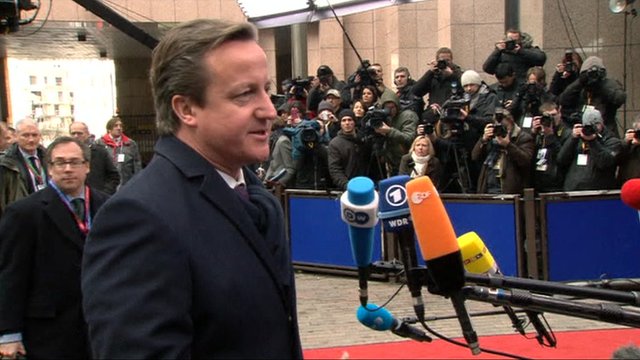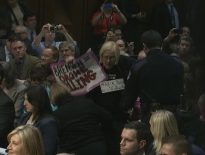EU leaders are edging towards a compromise deal on the 2014-2020 budget after all-night talks, officials say.

A broad framework was reported to have been agreed, but hard bargaining still lies ahead at the Brussels summit.
Leaders are studying proposals for a 908bn euro (£774bn) budget for the full seven years – 5bn euros lower than an earlier proposal.
In November the leaders failed to reach agreement amid deep divisions over cuts – a key UK demand.
Prime Minister David Cameron said again on Thursday that he would not accept a deal unless further cuts were made.
He said the figures being proposed for 2014-2020 “need to come down – and if they don’t… there won’t be a deal”.
If agreed, the cuts will make this the first multi-annual EU budget to see a net reduction.
Any one of the 27 member states can veto a budget deal – a fact which makes the negotiations all the more difficult.
Talks began later than scheduled on Thursday evening after leaders explored possible compromises in small groups earlier in the day.
Clash of priorities
One EU official told Reuters news agency on Friday: “We feel pretty confident that we have the framework for a deal. The deal is not completely finalised, but we feel sure it will be done today.”
The all-night talks appear to have cut an initial proposal of 913bn euros down to the figure of 908bn.
The latest proposal would also fix the absolute ceiling for spending at 960bn euros (£818bn), a cut of more than 12bn euros from the proposal in November.
This figure relates to spending commitments – the maximum amount that can be allocated to programmes during the budget period. What is actually spent is usually lower, as projects are cancelled or postponed.
Failure to reach agreement on the seven-year budget would mean the EU rolling over annual budgets – a method that would be more expensive and would complicate long-term projects.
The 2013 EU budget is 132.8bn euros – a 2.4% increase on the 2012 budget. The latest proposal, if divided equally over the seven-year period, would equate to 129.7bn euros annually.
EU sources say the new proposal will cut transport, energy and telecommunications projects, as well as pay and perks for EU staff.
The summit pits Mr Cameron and some northern European allies – who want EU spending reined in tightly – against mostly eastern and southern European countries who want to protect the big budget areas of agriculture and cohesion funding for the poorest regions.
France’s President Francois Hollande, a socialist, champions European “solidarity” and opposes the deeper cuts urged by Mr Cameron. Mr Hollande signalled some readiness to compromise, but said he would not accept a budget that “disregards agriculture and ignores growth”.
France is the biggest beneficiary from the EU’s Common Agricultural Policy, which accounts for about one-third of the entire budget.
The Commission – the EU’s executive body – had originally wanted a budget ceiling of 1.025tn euros for 2014-2020, a 5% increase. In November that ceiling was trimmed back to 973bn euros, equivalent to 943bn euros in actual payments.
But with other EU spending commitments included, that would still give an overall budget of 1.011tn euros.
The UK, Germany and other northern European nations want to lower EU spending to mirror the cuts being made by national governments.
The biggest spending areas – agriculture and regional development – are largely ring-fenced because of strong national interests, an EU source told the BBC.
The budget amounts to about 1% of the EU’s overall GDP – it is dwarfed by the combined national budgets.
Parliament’s voice
The BBC’s Europe editor Gavin Hewitt notes that whatever is agreed has still to go to the European Parliament, and MEPs are big backers of EU spending.
The summit was to have begun at 14:00 GMT on Thursday, but the formal session did not get under way until 19:45.
German Chancellor Angela Merkel – seen as the main powerbroker in the summit – had already acknowledged that the talks would be “very difficult”.
A European Commission spokesman warned that more staffing cuts would leave the Commission unable to do its job, as EU institutions integrated further and took on new responsibilities in response to the debt crisis.
The split in the EU reflects the gap between richer European countries and those that rely most on EU funding.
The argument for higher spending is supported by many countries that are net beneficiaries, including Poland, Hungary and Spain.
Others, mostly the big net contributors, argue it is unacceptable at a time of austerity. Germany, the UK, France and Italy are the biggest net contributors.





